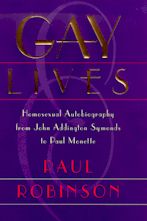 |

 |
|
Collected Sex Writings Sexually Speaking: Collected Sex Writings by Gore Vidal Donald Weise, editor; The Cleis Press; 285 pages; $24.95.
There is no such thing as a homosexual or a heterosexual person. There are only homo –
or heterosexual acts. Most people are a mixture of impulses if not practices, and what
anyone does with a willing partner is of no social or cosmic significance.
 This collection of Gore Vidal's sexual writings couldn't have come
at a better time. The recent wave of suburban school shootings has sent
America into a moralistic frenzy. Demagogues and politicians feed upon
this frenzy, coming up with simplistic and unrealistic "cures" for our
country's "moral crisis."
This collection of Gore Vidal's sexual writings couldn't have come
at a better time. The recent wave of suburban school shootings has sent
America into a moralistic frenzy. Demagogues and politicians feed upon
this frenzy, coming up with simplistic and unrealistic "cures" for our
country's "moral crisis."
Needless to say, banning "illicit" sex is high on our self-appointed guardians' agenda. Proposals range from media darling George W. Bush's suggestion that teens abstain from sex until they engage in a "biblical" marriage to Coral Ridge Ministry's media campaign to "cure" homosexuals. In his 50 year-plus career as a writer, actor, politician and curmudgeon, Gore Vidal has constantly opposed our country's religious establishment and moral tyrants. None of Vidal's writings have been as controversial as his writings on sex, which is why they had to wait for a small press, Cleis, to collect them into one book. The result is Sexually Speaking: Collected Sex Writings.
We enjoy his thought-provoking wit, even when his views exasperate us. Certainly Vidal's essentially essentialist take on "homosexualists"- "they" don't exist - will upset those of us who live our lives around the idea of an enduring gay identity. On the other hand, there is more in Sexually Speaking to upset the other side of America's cultural wars, especially those Jewish, Christian and Muslim fundamentalists who seek to impose their moral world view on the rest of humanity. They are the ones who, in Vidal's words, "divide the population into two teams. One team is good, godly, straight; the other is evil, sick, vicious." And we all know what team Vidal plays in. "I have tried, without much luck, to make the human declaration over the years. Unfortunately, Americans are so twisted from birth in their sexual attitudes and superstitions that very little reality can get through to them." It is our fortune that Vidal never stopped trying. Sexually Speaking also features Vidal's views on a variety of sexual personalities, including Henry Miller, David Reuben, Eleanor Roosevelt, Christopher Isherwood (a friend), Tennessee Williams (another friend, and Vidal's "Glorious Bird"), Oscar Wilde and Somerset Maugham. Of special interest to us are the three interviews: (1) By John Mitzel and Steven Abbott for Fag Rag (1974); (2) By Steven Abbott and Tom Willenbecher for Gay Sunshine (1974); and (3) By Larry Kramer for QW Magazine (1992). They almost, but not quite, turn Vidal into an activist. Which is no small feat. Gay Lives: Homosexual Autobiography from John Addington Symonds to Paul Monette by Paul Robinson; University of Chicago Press; 428 pages; $30.00.
 Palimpsest, Gore Vidal's 1995 autobiography, was pointedly left
out of Professor Robinson's study of gay male autobiographies. This is
because it does not meet Gay Lives' first criterion, which is to limit
the study to "autobiographers whose chief concern is to describe and
explain their love of men."
Palimpsest, Gore Vidal's 1995 autobiography, was pointedly left
out of Professor Robinson's study of gay male autobiographies. This is
because it does not meet Gay Lives' first criterion, which is to limit
the study to "autobiographers whose chief concern is to describe and
explain their love of men."
Gay Lives deals with 14 autobiographers who do: six Englishmen - John Addington Symonds, Goldsworthy Lowes Dickinson, Christopher Isherwood, Stephen Spender, J. R. Ackerley and Quentin Crisp - three Frenchmen - Andre Gide, Jean Genet and Julien Green - and five Americans - "Jeb Alexander", Donald Vining, Andrew Tobias, Martin Duberman and Paul Monette. Though all these autobiographers write about being gay in a straight world, they differ as to how they deal with issues of "identity", "masculinity" and "solidarity" (community). They also differ as to nationality: the British are fascinated by the "lower classes", the French philosophize their sexuality and eroticize national and ethnic differences, and the Americans write coming out stories and are "fundamentalists even in their perversity." I wonder what Crisp, Tobias and Duberman (the only ones still living) think of Robinson's take on their life stories. Robinson concludes with an "Epilogue" dealing with minority autobiographies, particularly those of Samuel R. Delany and Richard Rodriguez. |
 © 1997-99 BEI
© 1997-99 BEI